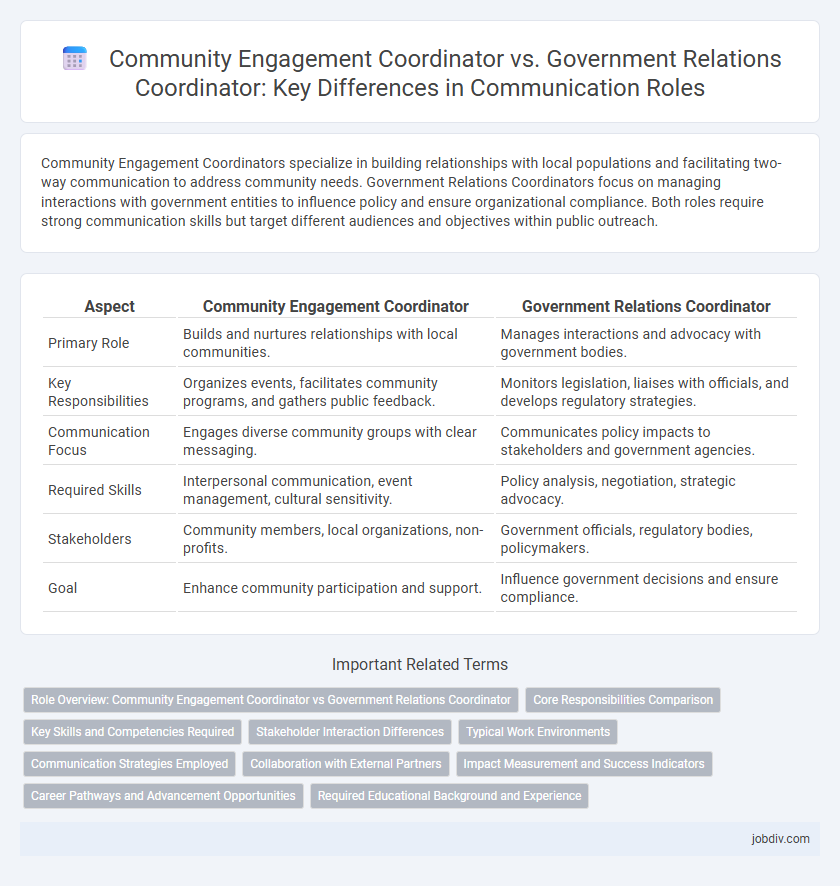Community Engagement Coordinators specialize in building relationships with local populations and facilitating two-way communication to address community needs. Government Relations Coordinators focus on managing interactions with government entities to influence policy and ensure organizational compliance. Both roles require strong communication skills but target different audiences and objectives within public outreach.
Table of Comparison
| Aspect | Community Engagement Coordinator | Government Relations Coordinator |
|---|---|---|
| Primary Role | Builds and nurtures relationships with local communities. | Manages interactions and advocacy with government bodies. |
| Key Responsibilities | Organizes events, facilitates community programs, and gathers public feedback. | Monitors legislation, liaises with officials, and develops regulatory strategies. |
| Communication Focus | Engages diverse community groups with clear messaging. | Communicates policy impacts to stakeholders and government agencies. |
| Required Skills | Interpersonal communication, event management, cultural sensitivity. | Policy analysis, negotiation, strategic advocacy. |
| Stakeholders | Community members, local organizations, non-profits. | Government officials, regulatory bodies, policymakers. |
| Goal | Enhance community participation and support. | Influence government decisions and ensure compliance. |
Role Overview: Community Engagement Coordinator vs Government Relations Coordinator
Community Engagement Coordinators focus on fostering relationships between organizations and local communities, organizing events, and facilitating two-way communication to address community needs and enhance participation. Government Relations Coordinators specialize in liaising with government agencies, monitoring legislative developments, advocating for policy changes, and ensuring organizational compliance with public sector regulations. Both roles prioritize strategic communication but operate within distinct stakeholder groups--community members versus governmental bodies.
Core Responsibilities Comparison
Community Engagement Coordinators focus on building relationships with local organizations, facilitating public participation, and organizing outreach programs to foster community involvement. Government Relations Coordinators prioritize managing interactions with government officials, tracking legislation, and advocating policies that align with organizational goals. Both roles require strategic communication skills but differ in target audiences and methods of influence.
Key Skills and Competencies Required
Community Engagement Coordinators excel in interpersonal communication, stakeholder management, and event planning to foster strong relationships within diverse populations, emphasizing empathy and cultural competence. Government Relations Coordinators require expertise in policy analysis, legislative processes, strategic lobbying, and negotiation skills to effectively influence public policy and advocate on behalf of organizations. Both roles demand exceptional communication abilities, problem-solving skills, and proficiency in building coalitions, yet the former prioritizes grassroots engagement while the latter focuses on navigating governmental frameworks.
Stakeholder Interaction Differences
Community Engagement Coordinators prioritize direct interaction with local residents, organizing events and forums to foster grassroots participation and gather diverse community feedback. Government Relations Coordinators focus on building and maintaining relationships with governmental bodies and policymakers to influence public policy and regulatory decisions. The primary difference lies in the audience focus: community engagement targets the general public and local groups, while government relations centers on formal, institutional stakeholders.
Typical Work Environments
Community Engagement Coordinators typically work in nonprofit organizations, local government agencies, and social service programs where they facilitate public participation and organize community events. Government Relations Coordinators are often employed by corporations, lobbying firms, or government offices, focusing on managing interactions with policymakers and regulatory bodies. Both roles may require frequent meetings, event coordination, and collaboration with diverse stakeholders in office settings or community venues.
Communication Strategies Employed
Community Engagement Coordinators utilize grassroots communication strategies, leveraging social media platforms, local events, and direct outreach to foster strong relationships within the community. Government Relations Coordinators focus on formal communication channels, including policy briefs, legislative updates, and stakeholder meetings, to influence public policy and build partnerships with government agencies. Both roles require tailored messaging techniques, but the Community Engagement Coordinator prioritizes inclusive, two-way dialogue, while the Government Relations Coordinator emphasizes strategic, policy-driven communication.
Collaboration with External Partners
Community Engagement Coordinators excel in building trust through direct interaction with local organizations, residents, and stakeholders, fostering grassroots collaboration that amplifies community voices. Government Relations Coordinators specialize in navigating legislative landscapes and cultivating strategic partnerships with government officials and agencies to influence policy and secure resources. Both roles require adept communication skills and a deep understanding of stakeholder interests to successfully align organizational goals with external partner objectives.
Impact Measurement and Success Indicators
Community Engagement Coordinators measure impact through metrics such as participant satisfaction, community event attendance, and levels of local stakeholder involvement, directly reflecting grassroots support and empowerment. Government Relations Coordinators assess success by tracking policy changes influenced, legislative outcomes, and strength of government partnerships, emphasizing strategic alignment with regulatory objectives. Both roles rely on qualitative and quantitative data, but the Community Engagement Coordinator centers on social impact indicators while the Government Relations Coordinator focuses on political and regulatory achievements.
Career Pathways and Advancement Opportunities
Community Engagement Coordinators often advance by specializing in public outreach and program management within nonprofit or municipal sectors, leading to roles like Public Affairs Manager or Director of Community Relations. Government Relations Coordinators typically progress by deepening expertise in legislative advocacy and policy analysis, aiming for positions such as Government Affairs Director or Senior Policy Advisor. Career pathways for both roles emphasize strategic communication skills, networking, and a thorough understanding of stakeholder interests to enhance influence and leadership potential.
Required Educational Background and Experience
Community Engagement Coordinators typically require a bachelor's degree in communications, public relations, or social sciences, paired with experience in grassroots organizing, event planning, and stakeholder outreach. Government Relations Coordinators often hold degrees in political science, public administration, or law, with expertise in policy analysis, lobbying, and legislative processes. Both roles emphasize strong interpersonal, negotiation, and strategic communication skills but differ in focus on community-based versus governmental environments.
Community Engagement Coordinator vs Government Relations Coordinator Infographic

 jobdiv.com
jobdiv.com